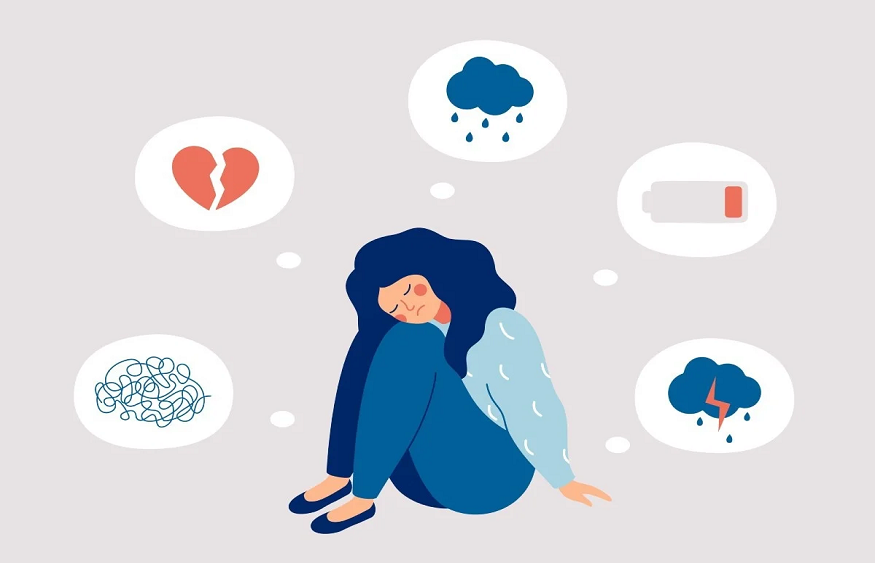It is estimated that one in five French people have suffered or will suffer from depressive disorder during their life. According to the WHO, depression is one of the leading causes of disability worldwide. This psychological disorder affects all social backgrounds and almost all ages. However, women are twice as affected as men. Providing psychological help and appropriate medications help people move toward a return to normal life.
What is depression?
Depression, also called depressive disorder , is a psychological illness characterized by a disturbance in mood. Depressive state causes a pessimistic view of oneself and the world around.
This mood disorder has a significant impact on the life of the person concerned, requiring treatment. The symptoms must be observed for a minimum period of two weeks, to be characterized as a depressive disorder.
The causes of depression:
A disability, a chronic illness, dependence on alcohol or drugs, etc. can be the cause of depressive disorder.
Difficult events
Different events can lead to the onset of depressive disorder: a difficult relationship with parents, sexual trauma, bereavement, separation, loss of a job, professional or family conflict, etc.
A poorly understood genetic origin
Some people experience depression more easily than others, sometimes for no apparent reason. This vulnerability is partly of genetic origin. If a person has had depression, their child is between two and four times more likely to develop a depressive disorder at some point. However, it is often the correlation between genes and a difficult experience that creates vulnerability to depression.
Physical and psychological symptoms
The patient complains of at least two of the following symptoms during a depressive state:
- Loss of interest : indifference to everyday activities and usually pleasant activities.
- Lasting sadness : regular repetition of this sadness, almost every day, for a minimum duration of two weeks.
- Decreased energy : during a depressive state, the person is tired and permanently lacks energy. Fatigue does not improve with a night’s rest.
Other symptoms may be present during a depressive disorder: loss of self-esteem , worthlessness, pessimistic outlook, suicidal ideation , decreased memorization, reduced ability to concentrate, feeling of uselessness, loss of unrefreshing sleep appetite.
How to treat depression?
Antidepressant medications are a standard treatment for depression. They act at the brain level to balance dysfunction. If prescribed correctly, medications are effective in the majority of cases.
The antidepressant helps reduce certain symptoms (discomfort, appetite, sleep, for example). To feel the effects, the patient will have to wait two to three weeks. The treatment takes place over two phases: an attack phase (six to twelve weeks) and a consolidation phase (several months). It is not recommended to suddenly stop antidepressant treatment.
In the treatment of depression, psychotherapy has proven effectiveness. Psychotherapy allows the patient to better understand their moral pain and to have help to combat their negative ideas.
Depression: who to consult?
In the event of depressive disorder, psychologists or psychiatrists are recognized as being able to conduct psychotherapy.
Psychologists complete 5 years of training in psychology at university and have a post-graduate diploma. Psychologists have not studied medicine, unlike psychiatrists. Since April 2022, “MonPsy” is a system allowing patients (over three years old) to benefit from support from a psychologist, over a maximum of eight sessions, free of charge. The system’s partner psychologists are available on the website monpsy.sante.gouv.fr
Psychopractitioners are professionals practicing psychotherapy (supporting people in a process of introspection or psychological care) . They use recognized methods, including:
Psychiatrists are doctors . They studied medicine and followed four years of training focused on mental illness. Consultations with a psychiatrist guarantee coverage by social security. The psychiatrist can issue medication or sick leave, unlike the psychologist.
Did you know ? MédecinDirect has psychologists and psychiatrists among its medical team, ready to support you via video teleconsultations.
Depression: what therapy?
Antidepressants act more on biological factors, while psychotherapy acts on the psychological. Several psychotherapy approaches exist regarding depressive disorder.
Psychotherapy is based on caring listening allowing free expression of the person’s experience. Thanks to this reassuring framework, the person can express their suffering and approach their problems with an outside perspective.
To reduce the symptoms of depressive disorder , psychoanalytic therapy and cognitive-behavioral therapy have proven effects.
Anxiety disorder is frequently associated with depression. People suffering from an anxiety disorder are at risk of developing depression. Although regularly associated, the two disorders are nevertheless different.
One of the differences is that the person in a depressed state feels unable to overcome a large majority of daily events. An anxious person is characterized by excessive reactions to situations without real danger.
What is seasonal depression?
Seasonal depression, also called Seasonal Affective Disorder (SAD), is a depressive state linked to a lack of natural light and the change of seasons. The person suffers from SAD when the depressive state occurs every year, in autumn and winter, for at least two consecutive years.

